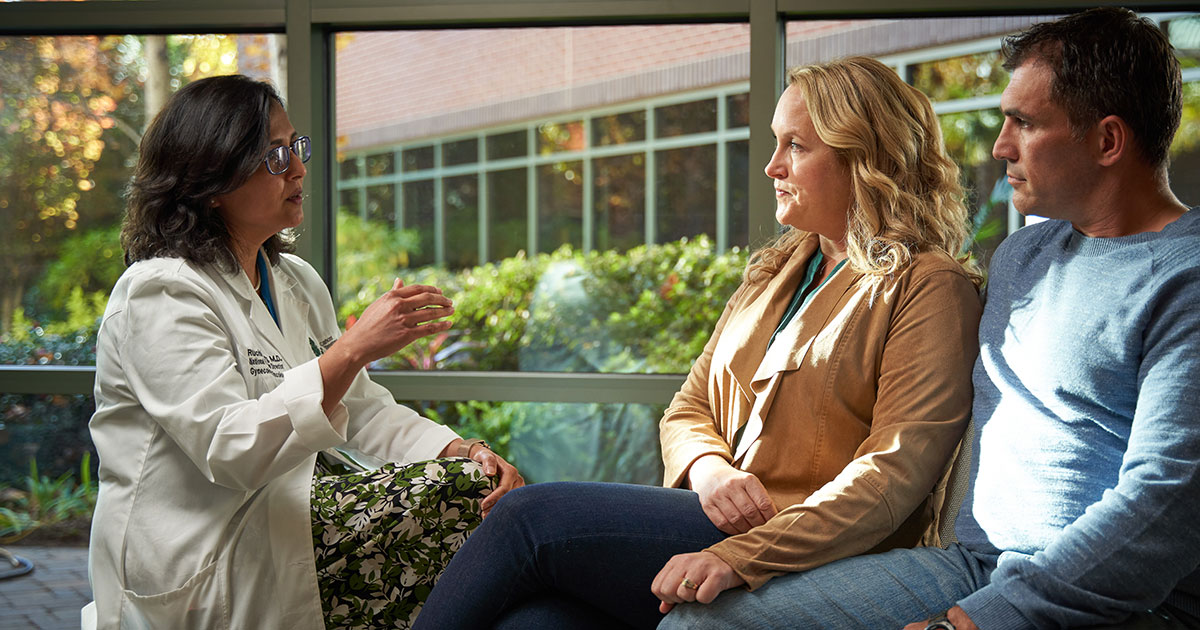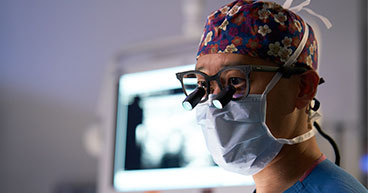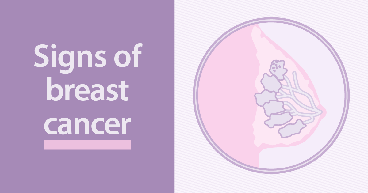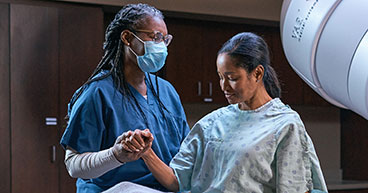
Menopause represents a major new stage in a woman’s life, marking the transition to her non-reproductive years.
This period may bring a fresh outlook on life and personal identity as well as physical changes that produce uncomfortable symptoms, like hot flashes and fluctuations in sleep habits or mood.
These changes often bring many questions and concerns, especially about added risks for developing cancer. We’ve compiled a list of some of these frequently asked questions, including:
- What is menopause?
- Does menopause raise the risk of developing cancer?
- Do natural hormonal changes that come with menopause have an impact on cancer risk?
- Is there a link between hormone therapies and cancer?
- Can natural or herbal remedies help relieve menopause symptoms?
- What’s the link between menopause and breast cancer?
- Do more women get ovarian cancer after menopause?
- Is vaginal bleeding after menopause always cancer?
If you’ve been diagnosed with cancer and are interested in a second opinion on your diagnosis and treatment plan, call us or chat online with a member of our team.
What is menopause?
Naturally occurring menopause—meaning it's not induced through surgical removal of the ovaries or other treatments—is the time when a woman's ovaries stop releasing eggs, leading to a decrease in the body’s production of estrogen and progesterone hormones.
The resulting fluctuation in hormones may cause irregular menstrual periods during perimenopause, the time leading up to menopause. A woman has officially hit menopause when she hasn’t had a menstrual cycle for 12 consecutive months. Typically, menopause starts around age 51, but it may start earlier or later.
Does menopause raise the risk of developing cancer?
“Older age is associated with higher risk of cancer—not menopause per se,” says Ruchi Garg, MD, Chair of Gynecologic Oncology at City of Hope Atlanta, Chicago and Phoenix.
Two menopause-related factors may increase cancer risk, according to the American Society of Clinical Oncology (ASCO).
Exposure to hormones like estrogen through hormone therapies:
“Natural hormonal changes don’t have an impact on cancer risks,” Dr. Garg says. “But external hormones that may be given to compensate for some symptoms of menopause may raise the risk of cancer.”
An increased number of ovulations over the course of a lifetime:
For instance, according to the National Institutes of Health, a woman who experiences menopause after age 55 has an increased risk of ovarian, breast and uterine cancers because she’s likely had a greater number of ovulations over her lifetime. The risk also is greater if a woman began menstruating before age 12 for the same reason. And, if a woman begins menstruating before age 12, begins menopause after age 55 or has never had children, the number of ovulations is higher over her lifetime.
Do natural hormonal changes that come with menopause have an impact on cancer risk?
“Natural hormonal changes don’t have an impact, but external hormones that may be given to compensate for some symptoms may cause or be associated with cancer,” Dr. Garg says.
Is there a link between hormone therapies and cancer?
Some women experience uncomfortable changes with menopause, including these common symptoms:
- Hot flashes
- Night sweats
- Sleep problems
- Mood changes
- Vaginal dryness and/or discomfort during sexual intercourse
- Weight gain
- Thinning hair
- Dry skin
It’s important to discuss any symptoms with your doctor, who may prescribe a menopausal hormone therapy to relieve severe symptoms, but usually at a low dose and for a short time.
“Hormone replacement therapy is still used to treat symptoms for a limited time, but it’s individualized. It’s not for every patient,” says Dr. Garg.
She adds that certain types of hormone therapy may be prescribed, even for cancer patients, for specific symptoms—like a low-dose estrogen cream, ring or tablet placed directly in the vagina to combat dryness. “It won’t have any systemic absorption that would increase a patient’s risk,” she says.
While hormone therapy may be appropriate for some patients, it must be considered carefully since research suggests a link to some cancers. For instance, patients who have an intact uterus and were given estrogen therapy that’s not counterbalanced with progestogen have an increased risk of uterine cancer, Dr. Garg says. For those who’ve had a hysterectomy or no longer have a uterus, estrogen therapy may be prescribed.
HRT and breast cancer
Combination hormone replacement therapy (HRT) or estrogen and progestogen together has been associated with increased breast cancer risk, Dr. Garg says.
Your health care provider will help you weigh your risks when considering HRT. Doctors don’t usually recommend HRT to women who have a history of or a higher risk for developing breast cancer, according to ASCO.
The Women’s Health Initiative study, one of the longest and largest women’s health study and clinical trial ever in the United States, involving more than 161,000 women, found that women taking HRT have a higher risk of:
But the findings from the study also found that these women had a lower risk of colorectal cancer and bone fractures.
You and your doctor should weigh the benefits and risks for your individual health profile when considering HRT.
Can natural or herbal remedies relieve menopause symptoms?
Over-the-counter treatments for menopause carry risks, Dr. Garg says, and may interact with prescription medications. It’s important that patients consult their doctors before taking any over-the-counter treatment for menopausal symptoms, she says.
Herbal remedies, such as black cohosh or red clover, are marketed to relieve menopausal symptoms, according to the American Cancer Society. These products are considered dietary supplements and have not been evaluated by the U.S. Food and Drug Administration to ensure dosing or safety.
Some small studies have been performed on how effective and safe these natural remedies are at treating the symptoms of menopause, but more research is needed.
What’s the link between menopause and breast cancer?
“Older age, but again, not menopause per se, is a risk factor for breast cancer,” says Dr. Garg.
The average age of a woman diagnosed with breast cancer is 63, and 71 percent of new cases are in women older than 55, according to the National Cancer Institute (NCI). Women with inherited genetic mutations to the BRCA1 and BRCA2 genes are at higher risk of breast and ovarian cancers.
As mentioned previously, however, combination (HRT) or experiencing a late menopause may increase cancer risk, Dr. Garg says.
Being overweight, especially after menopause, may increase breast cancer risk. Once the ovaries stop making estrogen after menopause, most of the hormones are produced by adipose tissue, otherwise known as fat. The more fat you have, the more estrogen you make, which may feed some breast cancers, causing them to grow.
Other risk factors for breast cancer include:
- Tobacco use
- Alcohol abuse
- A sedentary lifestyle
- Not breastfeeding
- Family history of cancer
- Dense breasts
Do more women get ovarian cancer after menopause?
Most ovarian cancers develop after menopause, according to the NCI. The average age of a woman diagnosed with ovarian cancer is 63, and 70 percent of all new diagnoses are in women 55 and older.
Women who have inherited mutations to certain genes, such as BRCA1 and BRCA2, are at higher risk of ovarian cancer and breast cancer.
Other risk factors for ovarian cancer include:
- Family history
- Inherited cancer syndromes, such as Lynch syndrome and Peutz-Jeghers syndrome
- A previous cancer diagnosis, especially breast, colorectal or endometrial cancers
Is vaginal bleeding after menopause always cancer?
While vaginal bleeding may be associated with non-cancerous conditions, bleeding after menopause should not be ignored, says Dr. Garg. “Twenty percent of the time, it can be associated with something abnormal,” she says, “even if it’s just spotting.”
“Approximately 9 percent of postmenopausal women who saw a doctor for bleeding later received a diagnosis of endometrial cancer,” a specific type of uterine cancer, according to the NCI.
The most common symptom of uterine cancer is abnormal uterine bleeding, which occurs in up to 90 percent of women with this type of cancer. Uterine cancer is uncommon in women younger than 45, with 60 being the average age at diagnosis in the United States.
Still, “cancer is the most serious, but also least likely, cause of bleeding after menopause,” the American Academy of Obstetricians and Gynecologists says.
The most common reason for postmenopausal vaginal bleeding is atrophy, meaning the tissue in the vagina or uterus has thinned due to natural hormonal changes, which may increase the likelihood of bleeding, according to the NCI.
The lining of the uterus also may thicken, which may result in bleeding, as may benign polyps in the uterus or cervix.
If you experience bleeding after menopause, consult with your doctor, who can perform further tests to rule out cancer or changes that may be a precursor to cancer.
If you’ve been diagnosed with cancer and are interested in a second opinion on your diagnosis and treatment plan, call us or chat online with a member of our team.



